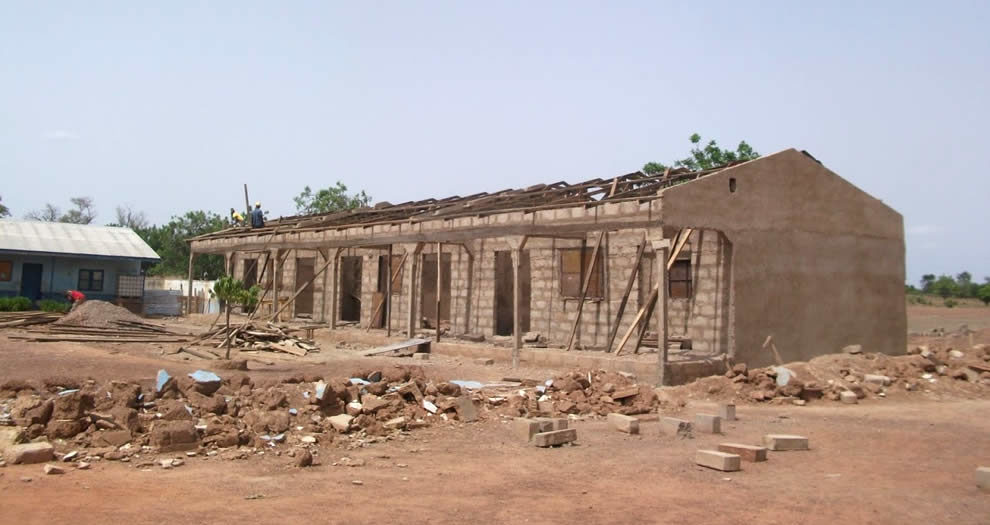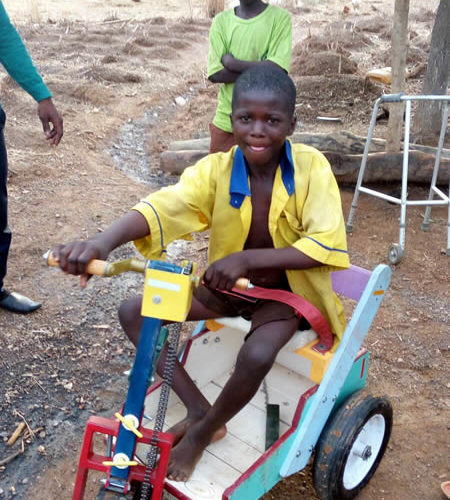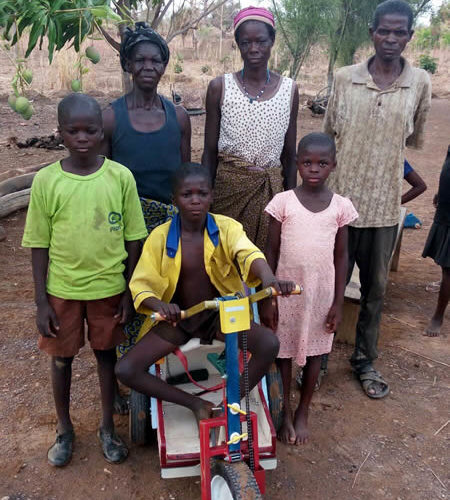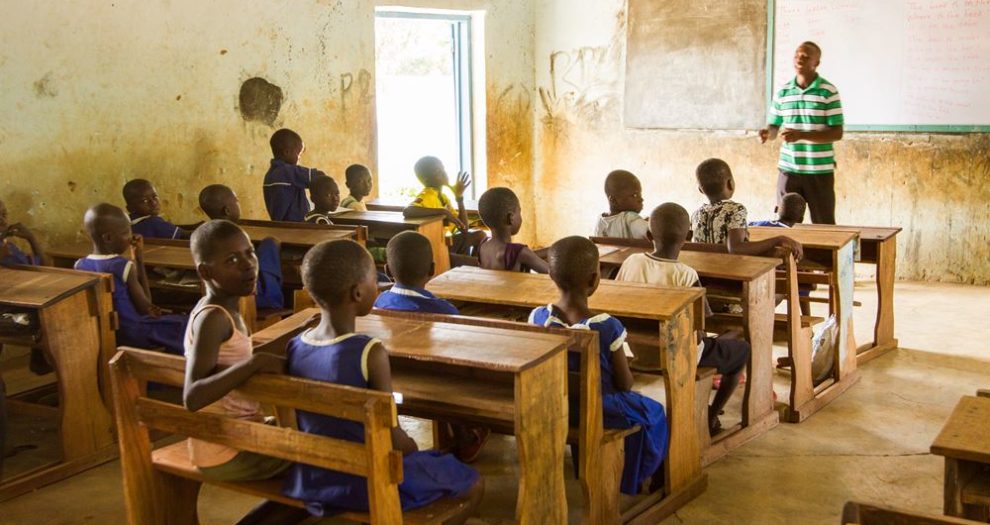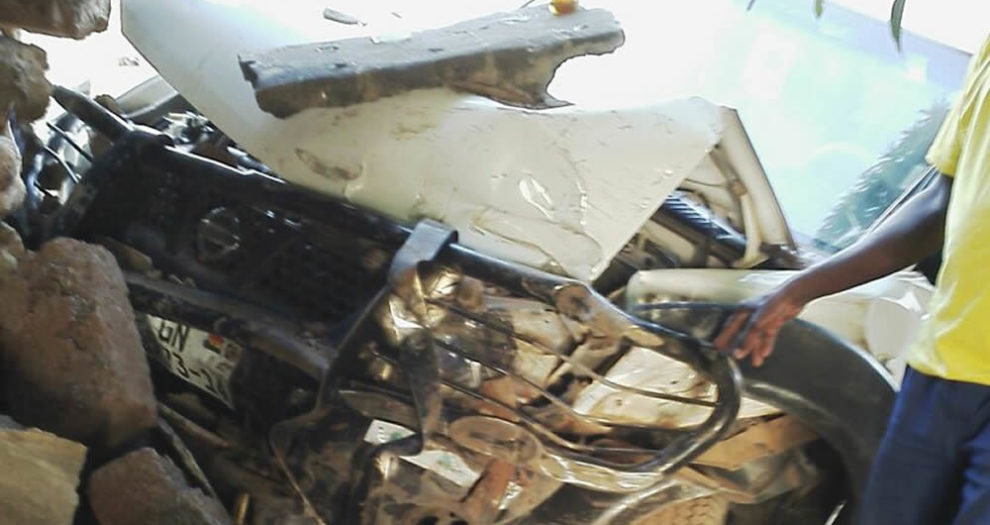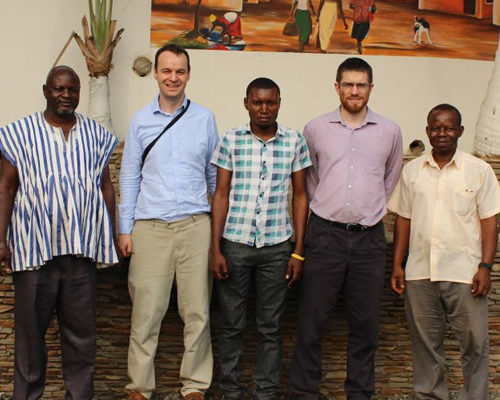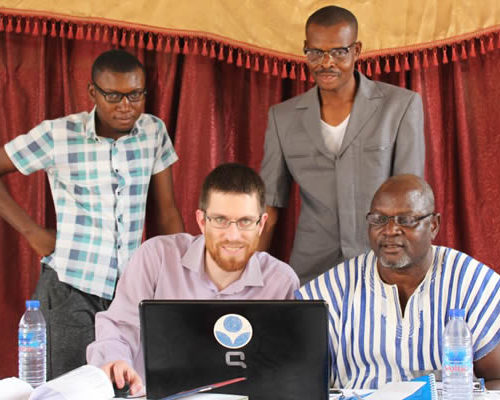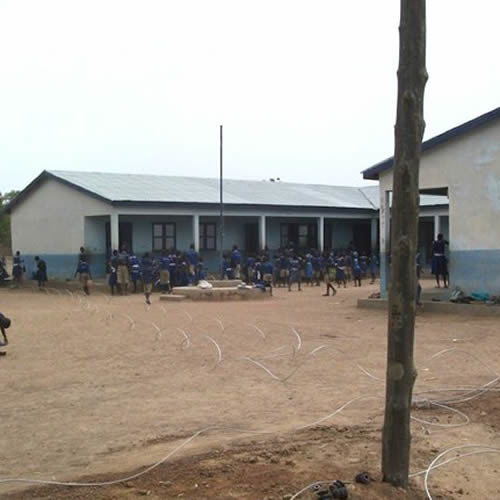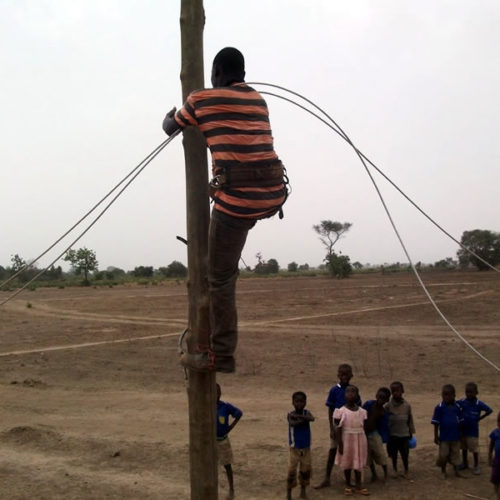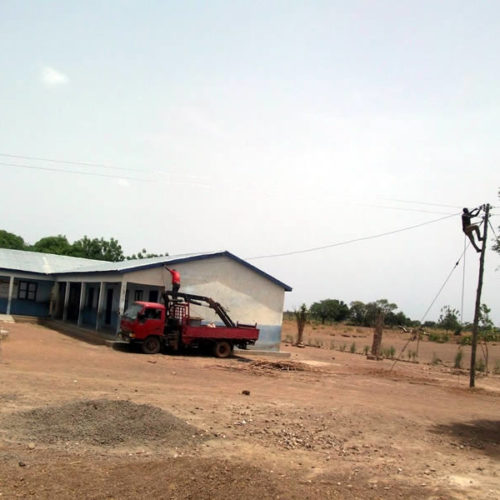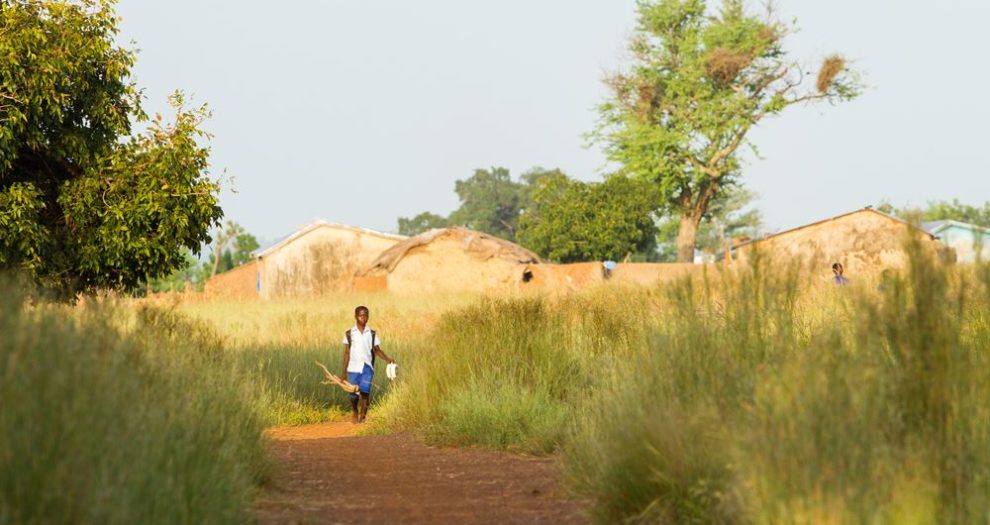Welcome to the online version of our Spring 2016 Newsletter. In this newsletter:
- Building, Building, Building
- Naab Beinir
- Training teachers
- A road accident
- Visit to Ghana
- Electricity: getting connected
- 10th Anniversary Publication
- A bereavement
- Scholarships
- New Junior High Schools
- Avios points (air miles)
- Thank you
Building, Building, Building
If you had visited the village schools over the past months you would have discovered plenty of activity. As well as the usual life of the school day – with children in blue uniforms arriving from scattered homes across the savannah – the villages have been alive to the sound of labourers undertaking various building projects. It has been a time of consolidation within our existing villages.
At Mettoh, work has just finished on a new toilet block for the pupils. This is extremely important in terms of improving the health and hygiene of the pupils. A recent study by the London School of Hygiene and Tropical Medicine showed that the provision of effective toilets at schools in Africa increased school attendance, particularly among girls.
A nursery school block at Gberi was constructed, and was completed in time for the start of the new academic year. There is also ongoing work to improve significantly the access route to the school, which is particularly difficult for pupils during the rainy season when the ground becomes very marshy.
In similar fashion at Pavuu, there has been work to improve the access route. A new nursery school block is reaching its final stages. The existing nursery school block is being renovated and will form the new Junior High School in Pavuu.
There has been major work at our first school in Bagri where the existing buildings have been extensively refurbished. Pupils are benefiting from a new toilet block, nearer to the school and of higher quality than the original one. The Savannah schools in the area have become associated with a bright blue colour, and the brilliance of the blue has again been restored following the painting of the refurbished buildings.
Naab Beinir
Of necessity, much of the progress reports for our supporters focusses on infrastructure and on general information. But we do not forget that the work is nothing without its impact on the lives of the children in these villages. For children with disabilities, life is especially hard. In previous newsletters we have talked about children like Beri, who lives very close to the school at Gberi. When we first met him he had to crawl in the dust and mud to get anywhere, but now he attends school everyday in the wheelchair provided for the purpose – and is doing very well in his studies.
We were concerned to hear of the severe disabilities of a boy called Naab Beinir, who lives in the village of Orbili. Funded by the charity, he has had some medical investigations which have uncovered some serious problems that are sadly untreatable in northern Ghana. We have, however, been able now to provide him with a specialist wheelchair.
Training teachers
The work of Savannah Education Trust is based around three core activities: building schools, feeding children and training teachers.
We are conscious that it is some time since we reported to supporters on our work of training teachers. Prospective teachers from the local area are being given scholarships to help fund their training. This is on the understanding that, once training is completed, the teacher will return to work in Lawra District.
A number of teachers from this scheme have now qualified and are working in the Savannah schools. Some ten others are currently undergoing training. One factor that has made the training of teachers easier is that a number of teacher training institutions and universities are now offering distance learning courses. The short video here tells the story of Amos, one of the people who has benefited from this programme.
A road accident
At the end of November, our Programme Manager, Pastor Charles Karbo, was involved in an accident while driving the Savannah vehicle. The front tyre burst which sent him off the dirt road forcing him to swerve to miss a mango tree but sadly not able to miss a wall.
A young girl was asleep under the tree and was narrowly missed. Thankfully, and miraculously, nobody was hurt. The vehicle, which was insured, has subsequently been repaired.
Visit to Ghana
In February 2016, some of the trustees visited Ghana to discuss the work with key members of the Savannah team. As with previous visits, we were extremely grateful to a kind supporter for covering the cost of our travel. It was a short and intense few days of meetings. We received a very warm welcome from our friends and colleagues, and discussed the full range of Savannah’s work (now increasingly complex across the five sites). We held a number of wide-ranging conversations spanning all areas of our activity – indeed the detailed notes of the conversations total some 13 sides of paper. As an example of one of the discussions, we agreed that each school will hold an annual prize giving to encourage both pupils and parents.
We are thankful for such a productive working relationship with the team in Ghana. It is always a moving moment when we say farewell to our friends at the airport. Such a short, intense visit also leaves us feeling slightly disorientated when we arrive back into such a different society in the UK …
Electricity: getting connected
The schools at Mettoh, Gberi and Pavuu all now have electricity from the national grid: the fruit of extensive lobbying by our Programme Manager, Pastor Charles Karbo, and funding provided to Savannah for this purpose by the Swiss company, u-blox. There are ongoing discussions about the possibility of electricity at Korh. The relatively remote riverside location at Bagri means that it is unlikely that they will be connected to the grid in the near future but the school, in the meantime, is making excellent use of solar panels.
10th Anniversary Publication
All supporters should have received a copy of the illustrated booklet produced to tell the story, with thanksgiving, of our first decade. The book was very kindly sponsored and so we are able to provide it free of charge. There are still a number left and do please feel free to let us know if you, or anyone you know, would like a copy.
A bereavement
The mother of Alfred Sugsou (our loyal accountant) passed away just before Christmas. She is described as “one of the pioneers” of Bagri Baptist Chapel. On the last Sunday before she died, she was too unwell to attend the chapel so, after the service, Pastor Charles Karbo and the congregation went to visit her in her mud hut to read and pray.
Scholarships
As we mentioned in our last newsletter, our very first cohort of students finished school at Bagri in the summer. It was a wonderful occasion. These children, who when we met them a decade earlier were malnourished and wearing rags, have now completed their basic schooling and taken the national exams. The results were very good, and we have been able to offer 20 scholarships in the first year for students to continue their studies at the Senior High School in Lawra (aged 14 to 17).
The cost of each scholarship, across three years, is currently about £330. As funds permit, we hope to offer a number of scholarships again this summer. The most likely jobs that these pupils will eventually take up are in the education or health professions.
It should perhaps be emphasised that the aim of the education provided by the charity has always been intended to help children even if they only have a basic education.
So the children who do not continue to Senior High School have many considerable benefits, not least improved knowledge of farming – and of health and hygiene. For example, “educating girls for six years … drastically and consistently improves their prenatal care, post-natal care and childbirth survival rates. Educating mothers also greatly cuts the death rate of children under five. Educated girls … are more likely to avoid HIV infection, violence and exploitation, and to spread good health and sanitation practices to their families and throughout their communities. And an educated mother is more likely to send her children to school” (UNICEF).
New Junior High Schools
All Savannah schools currently provide for children up until the age of 11. Supporters will recall that at our first school in Bagri a Junior High School block was constructed during 2011-12. ‘Junior High School’ is the description given to what approximates to secondary school in the British system (in Ghana, aged 11-14). The next two schools that are reaching the stage where pupils need a Junior High School are Pavuu and Gberi. The immediate future priority for work is therefore construction of such facilities in these villages and, as mentioned earlier in this post, the work at Pavuu has started. We hope, if the Lord will, a similar facility at Mettoh will follow in due course.
We are grateful to a grant-making charity, The Peter Stebbings Memorial Charity, for contributing a proportion of the cost of the construction of the new Junior High School facilities.
Avios points (air miles)
The only direct flight between London and Ghana’s capital, Accra, is currently with British Airways. When we recently visited we were able to reduce the costs by using our Avios points (a system that can be used to help purchase BA flights).
If any supporters have unwanted Avios points, or are flying but don’t already collect them, we would be grateful to have a conversation about donating them for trustees to use in travelling to Ghana.
Thank you
One of the things that struck us again during our short recent visit to Ghana is the way in which the scale of the work has increased recently. A short newsletter, of necessity, gives only a glimpse of the ongoing work.
We are very aware of our increased responsibilities and so have been thankful to appoint two new trustees: Richard Cooper and Tim Wiltshire. It will also be apparent that the expanding work comes with an increasing annual budget and so we remain extremely grateful to our kind and loyal supporters.

